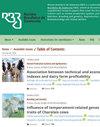Root exudation of oxalic acid in Lotus corniculatus in response to aluminum toxicity
IF 1.2
4区 农林科学
Q3 Agricultural and Biological Sciences
Revista Brasileira De Zootecnia-Brazilian Journal of Animal Science
Pub Date : 2022-01-01
DOI:10.37496/rbz5120210105
引用次数: 1
Abstract
- The objective of this research was to identify the existence of root exudation of organic acid in Lotus corniculatus germplasms subjected to toxic aluminum (Al) levels and investigate the effect of this mechanism on the Al content in the root tissue and in morphological parameters of plant development. Two experiments were performed in nutrient solution to evaluate the Al accumulation and exudation of organic acids, using cultivars INIA Draco and São Gabriel and genotypes UFRGS and UF-T2. The plants were cultivated in Al-free solution, which was applied on the 45th day in half of the pots of each genotype. Root exudation was highly correlated with the reduced accumulation of Al in the root tissue (r 2 = 0.75 at 72 h). Genotype UF-T2, selected for Al tolerance, extruded 80% more oxalic acid in the presence of Al compared with the other germplasms, indicating that this mechanism is involved with Al tolerance in . This experiment showed strong evidence that L. corniculatus exhibits Type I tolerance, in which anionic channels are rapidly activated by Al exposure. Exudation of oxalic acid is likely a crucial mechanism that allows the maintenance of L. corniculatus growth when exposed to toxic Al conditions, and this characteristic should be used to identify tolerant genotypes in the future.对铝中毒的响应,白莲根部草酸渗出
-本研究的目的是在毒性铝(Al)水平下鉴定白莲种质中存在根渗出有机酸的现象,并探讨这一机制对根组织中Al含量和植物发育形态参数的影响。以水稻品种INIA Draco和s o Gabriel以及基因型UFRGS和UF-T2为研究对象,在营养液中对有机酸的Al积累和分泌进行了研究。植株在无铝溶液中培养,45天在每个基因型的一半盆栽中施用无铝溶液。根分泌物与根组织中Al积累的减少高度相关(72 h时r = 0.75)。选择具有Al耐受性的基因型UF-T2在Al存在下比其他种质多挤出80%的草酸,表明这一机制与Al耐受性有关。本实验有力地证明了L. corniculatus表现出I型耐受性,其中阴离子通道被铝暴露迅速激活。草酸的分泌可能是L. corniculatus在暴露于有毒铝条件下维持生长的关键机制,这一特征应该在未来用于鉴定耐受性基因型。
本文章由计算机程序翻译,如有差异,请以英文原文为准。
求助全文
约1分钟内获得全文
求助全文
来源期刊
CiteScore
1.90
自引率
0.00%
发文量
25
审稿时长
8 weeks
期刊介绍:
The Revista Brasileira de Zootecnia (RBZ; Brazilian Journal of Animal Science) encompasses all fields of Animal Science Research. The RBZ publishes original scientific articles in the areas of Aquaculture, Biometeorology and Animal Welfare, Forage Crops and Grasslands, Animal and Forage Plants Breeding and Genetics, Animal Reproduction, Ruminant and Non-Ruminant Nutrition, and Animal Production Systems and Agribusiness.

 求助内容:
求助内容: 应助结果提醒方式:
应助结果提醒方式:


